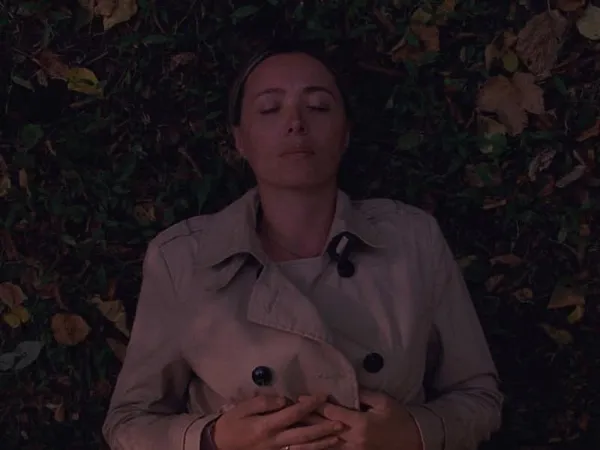Eye For Film >> Movies >> Beginning (2020) Film Review
Beginning
Reviewed by: Anne-Katrin Titze

Dea Kulumbegashvili’s debut feature Beginning (Main Slate selection of the New York Film Festival), co-written with Rati Oneli, executive produced by Carlos Reygadas and Gaetan Rousseau, stars Ia Sukhitashvili with Oneli and Kakha Kintsurashvili. Matthieu Taponier, the editor of László Nemes’s Oscar-winning film Son Of Saul, starring Géza Röhrig, was also the editor and co-writer with Nemes and Clara Royer on Sunset (Napszállta), featuring Juli Jakab and Vlad Ivanov. Taponier edited Beginning, shot by Arseni Khachaturan with music by Nicolas Jaar.
Beginning begins in a small Jehovah's Witness prayer house in rural Georgia. The woman Yana (Ia Sukhitashvili) whose story this is, greets the congregation one by one as they enter. The carpet is red, the people are happy to attend. Yana’s husband David (Rati Oneli) gives the sermon about Abraham and Isaac, and asks if Abraham was really intent on killing Isaac, his only son. “He took the knife, raised it, and waited,” says David.
A curious small detail occurred earlier. Yana had put on her handbag cross-body style, a precaution any New Yorker would understand. But in a country church? Does she not trust these people? Or is she anticipating things to come? As the sermon continues about morals and sacrifice, the door is opened and fire is set. The static camera does not show us who did this and instead stays calmly on the chaos within as the building goes up in flames.
The lengths of time the shots last and the camera angles that hide more context than they reveal are what formally is most striking about Beginning. But it is the story that sticks with you. The police, so it seems, have footage of the perpetrators but remain less than helpful. David wants to rebuild the prayer house and plans to travel to an upcoming congress and ask the elders for money. His wife wants to leave, although, or maybe because, she is from the area. She has no friends, she says, and neither does their son Giorgi (Saba Gogichaishvili), despite the fact that we see him run and play with other kids at every opportunity.
After what had occurred at the church (and what will come in retrospect), the simple marital controversy over windows open or closed at night, gains new meaning and urgency here. Yana begs David for a transfer elsewhere because she knows the local police won’t lift a finger and it is not safe for them to stay. “Can’t you act like a normal person?” he says. “You said you needed seven years for your career” she says and gives him a pill. In a month they’ll have a new prayer house, he predicts.
She does not want to go to the congress with him and again he compares her to that elusive “normal person” she is not. “Find a job” he says and reminds her that she can’t be “an actress and my wife”. Those are the rules of the community and Yana replies with the one sentence that marks and grounds the film: “I am waiting for something to begin or to end.” A stranger greets her when she looks into the mirror at herself.
Yana works with a group of kids to prepare them for baptism. Kulumbegashvili’s enticing choice of frame does not show us the face of the boy who stumbles through the biblical text, but the other children’s good-natured laughter and reaction. Giorgi uses the expression “I swear on your life” to his mother’s face, which she understandably resents. With the father presumably away on his trip, mother and son walk in the woods together, take in nature, cross pebbles and a brook. Before bedtime she has to coax him to take a bath, “you want to go to bed all dirty like a piglet?”
That night, we see her sitting at a table alone when the doorbell rings. Kulumbegashvili has taken great care that we do not know the layout of the house and the rooms. It is the exact opposite of what Kleber Mendonça Filho did with Aquarius, where the sense of space makes us feel completely clued in. Both tactics work gratifyingly as variations on the uncanny.
A male voice states that he is from the police department in Tbilisi and wants to ask Yana some questions about the fire and her husband’s complaint. She lets him in. He wears jeans, his hair is greying at the temples. The house gets the feel of a stage. The ensuing dialogue recalls Treat Williams as Arnold Friend in Joyce Chopra’s Smooth Talk and Willem Dafoe’s Bobby Peru scene in David Lynch’s Wild At Heart, both featuring Laura Dern in the female role.
In Beginning, the interaction is carefully constructed. When the man leaves the frame it makes us nervous. She can see him, we cannot. This is a curious reversal of the all-knowing spectator who wants to warn the characters of possible dangers they can’t see. Here, because of the nature of the words spoken, we still may feel this way, but lack the visual information Yana has.
The theatricality of the mise-en-scène takes away some of the worry but not quite. And not for long. She tells him to leave. “What if I don’t” is his reply, followed by “tell me the truth and I’ll go.” False testimonies are born this way. The power of words manifests itself in the violet act of making someone say something they don’t want to say. “Are you scared of me?” He asks. When Yana inquires at the police station the next day, nobody seems to know about the officer from the capitol.
The night before, Yana slept in her son’s bed, huddled with her head by his feet. Who comforts whom? When she wants Giorgi to stay indoors, she invents a game. “Close your eyes and imagine what you would do outside,” she says. He would play football with his friends as goalkeeper and chase dogs, he says. Another game during a walk in the woods consists of mom playing dead, lying down on the autumn leaves. She breathes in, closes her eyes, while being filmed from above. Birdsong is in the air and Giorgi pleads evermore urgently for her to wake up. Shadows change on her face, bees and other insects are buzzing. “Did I scare you” is a question we’ve heard before.
The doorbell rings again that night and goes unanswered. It is a beautiful evening and purple flowers blossom by the stream near the rocks. Yana leaves the house, despite what I can only imagine are most viewers’ silent protestations. What follows is one of the most jarring sequences I have seen in a while. Later that same night, we meet Yana’s mother and little sister and the sister’s baby. The mother recounts a story that took place during Yana’s childhood. She was a loud baby, and one cold February night, the father locked his wife and child out of the home. “I was so hurt by your father, you enjoyed it and slept peacefully”. Why did she not leave, Yana asks. “Who would have married a second-hand woman with a child?” The mother asks back. Times are different now, or are they?
Meanwhile during the occurrences earlier, Yana and the film seem to have forgotten about Giorgi. Husband David returns, having secured things. “I’ve settled everything” he proudly states. In a month there’ll be a new building. If audiences went into the direction of what happened being a dream, there is a rude awakening. Eventually David shows his true colors. “I created you,” he says to the woman he “dragged out of [her] misery. This is how you thank me?” The tale collected by the Brothers Grimm, called Freddy and Katy, came to mind. In it (if you take the censorship of a possible assault into account) a husband refuses his wife entry to their home - a quintessential example of victim blaming.
There are scenes in Beginning that defy logic, such as how the husband’s nightly visit to the police station plays out. Nobody would be allowed to wait unattended in the chief’s private office. When the film returns to the congregation in the form of a baptism ceremony, we have almost forgotten the Jehovah’s Witness context, so much has happened. The children are questioned what they prepared for and they tell about the two doors, one to heaven and one to hell.
“I want to forgive you,” says the husband. “You won’t be able to” says the wife. Joan Didion in her essay Sentimental Journeys on what is known as the Central Park Five rape case, wrote: “The convention assumes that the violation is of a nature best kept secret, that the rape victim feels … that she has been in an unspecified way party to her own assault.” Didion continues: “These quite specific masculine assumptions (women do not want to be raped, nor do they want to have their brains smashed, but very few mystify the difference between the two) tend in general to be self-fulfilling, guiding the victim to define her assault as her protectors do.”
These are thoughts that can be triggered by Beginning. The baffling ending may move it all closer to Lars von Trier territory in Breaking the Waves, but it also feels a bit like a gimmick that allows an out that isn’t actually there. At the San Sebastian Film Festival, Beginning won Best Film, Best Director, Best Screenplay, and Ia Sukhitashvili won Best Actress.
Reviewed on: 13 Oct 2020
















